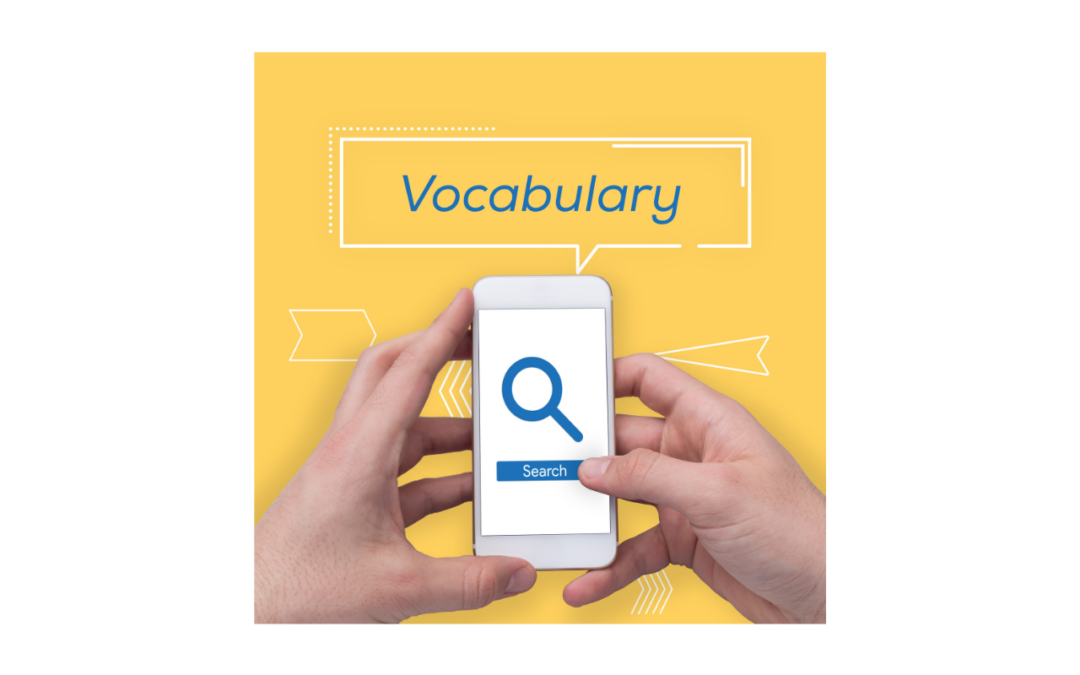
by Erica L. Meltzer | Dec 30, 2023 | The Digital SAT, Vocabulary
Traditional vocabulary is back on the SAT, and I’m happy to announce that the second edition of SAT® Vocabulary: A New Approach, co-written with Larry Krieger, is now available.
The book has been completely revamped for the DSAT and features an extensive list of high-frequency, not-irrelevant vocabulary words (as reported by students who have sat for digital exam internationally), with definitions illustrated through a variety of entertaining pop-culture example. Numerous test-style practice questions then help students transfer their knowledge to Digital SAT format.
A separate section on transitional words and phrases helps test-takers simplify challenging questions by identifying common logical relationships and grouping words by category.

by Erica L. Meltzer | Oct 7, 2023 | The Digital SAT, Vocabulary
Larry Krieger and I have been hard at work on our digital-SAT edition of SAT Vocabulary: A New Approach, with release tentatively planned for December. Unfortunately, I’ve been pretty much out of commission with a bad cold the last couple of weeks, but Larry has come to the rescue with a fabulous post featuring the saga of Taylor and Travis… along with some top words for the new test. Even if you’re not a Swiftie, it’s good reading. Here goes:
Students often complain that learning vocabulary words is tedious and boring. Not in our book! We have written a series of special chapters that use popular movies like Barbie, Oppenheimer, and Avengers: End Game to illustrate the words on our list. The following chapter on the possible romance between Taylor Swift and Travis Kelce illustrates our unique method of helping your remember difficult DSAT vocabulary words.
1. Taylor Swift ECLIPSES the game
ECLIPSE – to overshadow
On Sunday September 24th the defending Super Bowl champion Kansas City Chiefs played the Chicago Bears before a capacity crowd of 76,000 fans at Arrowhead Stadium. Led by their Superbowl MVP quarterback Patrick Mahomes and their all-pro tight end Travis Kelce, the Chiefs quickly took command of the game. Within a short time the crowd’s attention switched to an unexpected global celebrity – Taylor Swift! Taylor’s presence in a luxury suite seated beside Travis Kelce’s mom quickly ECLIPSED interest in the game. Fueled by Swift’s 12-17 and 18-49 year-old fans, television ratings soared as an estimated 24 million people watched the game.
2. Swifties begin to make INFERENCES
INFERENCE – a deduction or conclusion based upon evidence and reasoning
Known as Swifties, Taylor’s fans quickly began to make INFERENCES about her unexpected appearance at an NFL game. Taylor is well-known for leaving her fans carefully planted clues called “Easter eggs.” Afterall in her song “Blank Space”, Taylor declared, “Love’s a game, wanna play?” Many INFERRED that this was Taylor’s way of signaling the beginning of a romantic relationship with Travis.
3. Taylor fails to RECIPROCATE
RECIPROCATE – a mutual or equivalent exchange
The relationship between Taylor and Travis did not get off to a promising start. Travis attended Taylor’s sold-out concert at Arrowhead Stadium back in early July. He tried to send Taylor a friendship bracelet with his number. But Taylor did not RECIPROCATE. Ouch!
4. Travis is RESILIENT and refuses to give up
RESILIENT – able to bounce back from adversity; quickly recover
Taylor’s failure to respond to his invitation did not deter Travis. Although he admitted to feeling “a little butthurt,” Travis was RESILENT and refused to give up. He used his popular podcast to send Taylor this message: “I’ve seen you rock the stage at Arrowhead Stadium. You might have to come see me rock the stage in Arrowhead and see which one’s a little more lit>”
5. Would Travis’s AUDACIOUS invitation work?
AUDACIOUS – bold and daring
Travis’s AUDACIOUS but risky public invitation worked. Taylor attended the game and then left the stadium with Travis in his prized 1970 Chevolet Chevelle SS convertible. Wow – that really is AUDACIOUS. But Travis wasn’t finished. He drove Taylor to a private dinner party at a well-known and fully reserved Kansas City restaurant. Taylor reportedly had a great time dancing with Travis and meeting all-world Kansas City quarterback Patrick Mahomes.
6. An INDELIBLE day
INDELIBLE – memorable; cannot be forgotten
Travis clearly seized the moment and tasted it. The game and the evening dinner party left him with INDELIBLE memories. Travis later reported that Taylor “looked amazing” and that “everybody in the suite had nothing but great things to say about her…It’s definitely a game I’ll remember, that’s for damn sure.”
7. The game was PERIPHERAL
PERIPHERAL – of secondary importance; not central
The Kansas City Chiefs narrowly defeated the New York Jets in an exciting Sunday Night Football game. But the game was a PERIPHERAL sideshow to the night’s real story. All eyes were focused on a private suite containing Taylor Swift and her entourage of Hollywood pals that included Deadpool 3 actors Ryan Reynolds and Hugh Jackson and Game of Thrones star Sophie Turner. The NBC camera crews obliged Taylor’s legion of Swifties by cutting from the game to her box 17 times.
8. Taylor is an economic CATALYST
CATALYST – any stimulus that causes significant change or action
Over 27 million viewers tuned in to watch Taylor Swift and her entourage of celebrities watch the Sunday Night Football game. Taylor’s economic impact is much greater than prompting her legion of Swifties to watch a football game. Taylor is a significant economic CATALYST. Her Eras Tour is on track to become the biggest and most profitable in concert history. When Taylor
comes to town her fans go on a spending spree by filling hotels, packing restaurants, and purchasing everything Taylor-themed bracelets to expensive cloths.
9. This is INTRIGUING!
INTRIGUING – arousing great interest and curiosity
So what will happen next? Sports fans and Swifties are INTRIGUED! Is this the beginning of a new romantic relationship? Will Travis + Taylor = Traylor? Or will Travis end up in one of Taylor’s songs? But one of Taylor’s most popular songs does offer a ray of hope: “I’ve got a blank space baby and I’ll write your name.” Could Travis be the one? Stay tuned!!
10. Questions and CONJECTURES
CONJECTURE – an opinion or conclusion formed on the basis of incomplete evidence; speculation
The apparent romantic link between Taylor and Travis is like an unexpected meteor strike that has ignited a social media firestorm. Commentators on podcasts, TikTok, and Instagram are all spreading rumors, providing breathless headlines, and asking endless questions. But their revelations are all CONJECTURES. The reality is that no one knows what Taylor and Travis will do next. But one thing is certain – Erica and I will keep you posted on all the breaking news!!!

by Erica L. Meltzer | Jun 23, 2022 | CELPIP, ESL, IELTS, Vocabulary
The Critical Reader is excited to announce the sometime in the next few weeks (exact date TBA), we will be launching a free daily email idiom program for English learners.
If you would like to sign up, please enter your email in the form below. (Note that you must use the form to register; comments for this post have been disabled.)
The focus will be on words and phrases that can be used in IELTS Writing and Speaking, but the content will also be broadly relevant to other popular tests, including TOEFL, PTE, and (especially) CELPIP. And if you’re just looking to improve your English in general, you’re of course welcome to join as well.
Every day, members will receive an email with a new expression + definition, along with a sample sentence clearly illustrating its use. Both informal and formal language will be covered and labelled appropriately.
This program does not focus on the clichés commonly taught in ESL classes or on social media (e.g., A piece of cake, once in a blue moon) but rather on common, contemporary phrases and collocations that can help your speaking or writing sound more natural.
In addition, if there are any expressions you find particularly confusing or would like to have a better understanding of how to use, please feel free to let us know, and we will do our best to incorporate them into the program.

by Erica L. Meltzer | Jul 6, 2019 | Blog, Vocabulary
In the course of my recent research on the phonics debate, I came across an idea that in retrospect should have seemed obvious but that nevertheless seemed entirely surprising when I encountered it—namely, that a reliance on context clues is a strategy employed primarily by poor readers.
Consequently, when schools teach young children to use context clues as a decoding aid, they are actually encouraging them to behave like weak readers. Strong readers, in contrast, rely primarily on the letters themselves to figure out what words are written.
According to Louise Spear-Swerling, professor of Special Education at Southern Connecticut State University:
Skilled readers do not need to rely on pictures or sentence context in word identification, because they can read most words automatically, and they have the phonics skills to decode occasional unknown words rapidly. Rather, it is the unskilled readers who tend to be dependent on context to compensate for poor word identification. Furthermore, many struggling readers are disposed to guess at words rather than to look carefully at them, a tendency that may be reinforced by frequent encouragement to use context. Almost every teacher of struggling readers has seen the common pattern in which a child who is trying to read a word (say, the word brown) gives the word only a cursory glance and then offers a series of wild guesses based on the first letter: “Black? Book? Box?” (The guesses are often accompanied by more attention to the expression on the face of the teacher than to the print, as the child waits for this expression to change to indicate a correct guess.) (more…)

by Erica L. Meltzer | Jun 29, 2019 | Vocabulary
As I was categorizing the reading questions from the new tests in the 2020 edition of the Official SAT Guide, I noticed something a little odd about question #47 from the October 2017 exam.
The question, which accompanies a passage about the search for new types of antibiotics, reads as follows:
In line 79, “caveats” most nearly means
A) exceptions
B) restrictions
C) misgivings
D) explanations
Now, the answer, C), was correct in the most technical sense. Among the answer choices, “misgivings” obviously made the most logical sense when it was plugged into the passage, and it was perfectly consistent with the list of drawbacks the author provided in regard to a particular drug.
But when I thought about it, something about the question kept nagging at me. (more…)

by Erica L. Meltzer | Jan 12, 2018 | Blog, GRE, Vocabulary
If you’re studying for the GRE® and want to learn some words for which ETS has, shall we say, traditionally shown a strong predilection (i.e., proclivity, penchant, propensity, bent), the Critical Reader is now offering a Word of the Day email program.
One email with a top word, a GRE-level example sentence, and a list of must-know synonyms/antonyms, every day, direct to your inbox, plus periodic quizzes, every day for 100 days.
Click here to sign up.
(more…)





